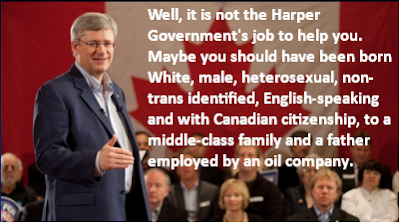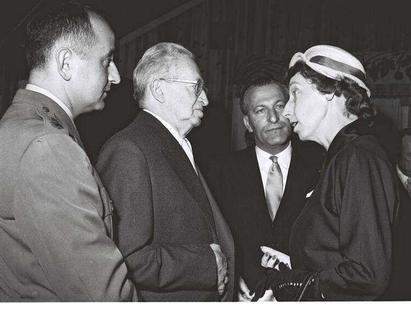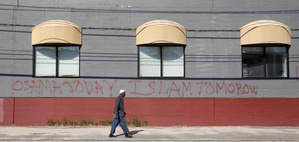A short list of major events in the past month:
- May 24-25: Tornadoes in Oklahoma and Kansas and Arkansas, USA. 13+ fatalities
- May 22: Tornado in Joplin, Missouri, USA. 123+ fatalities
- May: Mississippi River Flood, All along the river (Illinois, Missouri, Kentucky, Tennessee, Arkansas, Mississippi, Louisiana)
- May: Flooding of Red River; Assinboine River, Manitoba, Canada; North Dakota, Minnesota, USA.
- April 25-28: Super Outbreak, Alabama and 20 other states, USA. 327+ fatalities
 |
| via SunSentinel.com |
* While these events may not be directly linked to climate change, especially not immediately due to lack of data. Climate change means extreme weather events may be stronger, more frequent, etc.
 |
| by Joel Pett via AAEC |
Part of me agrees with Larry Powell, a long-time journalist, activist, photographer and writer based in rural, western Manitoba. I want to type: "It's Global Warning, Stupid!"
I don't know any climate change deniers but apparently they exist. According to this recent article, 9 out of 10 of the most prolific climate change denier publishers are linked to ExxonMobil. There are others who simply argue against changing the Western lifestyle model of over-consuming the planet's resources - because either it's too late, or it can't be done, or the economy would be compromised. In short, we can't afford to change.
But as many environmental activists have asked: Can we afford not to?
Even without the pressing issue of climate change, there are other reasons that we should care about the earth and everything on it. Climate change aside, humans are contributing to:
- rapid and significant loss of biodiversity
- fresh water shortages
- pollution: air, water, soil
- plastic pollution (heard of the gyres?)
Or, we could buy into some specie-ism (like sexism, but for species), and think about how we impact our fellow human beings through our interaction with them and the planet. Here are some examples of environmental racism from the USA:
Cancer Alley is an area in Louisiana formerly referred to as the Petrochemical corridor - where petrochemicals are processed. The population is composed of African-American and low-income individuals with little university level education, and there are high unemployment levels despite the industry. There are also high rates of cancer found in Louisiana (#2 in USA), as well as more incidents of rare cancers than normal.
Hurricane Katrina severely impacted residents of New Orleans, Louisiana in 2005. Due to drilling and extending pipelines over the years, the wetlands, which are natural defences against soil erosion, were damaged which led to more severe flooding in harsh weather. Additionally, certain people had the means to leave the city (evacuation plans centered on individuals using their own cars to exit the city) while others did not. The division was clearly related to race, citizenship, income level, etc.
The BP Oil Spill in the Gulf of Mexico in 2010 affected subsistence fisher(wo)men and many others employed in the area. Certain populations were more severely impacted in the aftermath of the blow-out: immigrants, prisoners (essentially slave labour) and the impoverished fishing community were paid too little, if anything, to clean up oil and tar from the beaches and sea, and were not given appropriate protection for the bodies. Many became ill during or after working on the clean up.
And in Canada?
 |
| via Tree Hugger |
The Tar Sands/Oil Sands in Alberta, Saskatchewan and Northwest Territories, have been described as one of the worst environmental disaster in the world. Aboriginal people in the region have not been included in the “development.” First Nations peoples have been neither consulted nor compensated for the destruction of the land and water. One specific case is of the Fort Chipewyan aboriginal people who have reported large increases in cancer rates as tar sands production has increased upstream; the fish are sick and inedible and many residents no longer drink the water.
What about people who don't have the privileges that come with being American or Canadian?
Texaco (acquired by Chevron, 2001) polluted Ecuador for decades and refuses to compensate local inhabitants. The Ecuadorian Amazon was polluted by Texaco from the time it began drilling without permission of the local population. The company cut costs by dumping 18 billion gallons of toxic waste water and 17 million gallons of oil, and abandoned more than 90 unlined/uncovered water pits filled with toxic sludge. The impacted indigenous peoples, mostly impoverished mestizo communities, had their water sources polluted, which has caused fish to disappear and become inedible, cancer rates have risen, many have experienced birth defects, etc. Chevron claims there’s no solid evidence; lawsuits were in courts in USA and Ecuador since 1993; recent ruling (Feb. 14, 2011) by Ecuador courts found Chevron guilty ($8.6 billion); currently, Chevron is fighting the judgement and denying wrongdoing.
 |
| via The Chevron Pit |
So how is all of the above connected to flooding and tornadoes? In multiple ways. In a Lion King way, we're all part of the circle of life. In an Interlocking Systems of Domination theory way, different types of systemic oppression are interconnected and interdependent and we all occupy a location within each of these systems.
For example: racism, sexism, heterosexism and cultural imperialism all rely on each other. As a white, heterosexual, Canadian I privilege from systems that oppress others, but as a woman, sexism's raison d'être is to oppress me. All of these -isms rely on each other.
Sherene Razack clearly explains why we should be fighting against every type of oppression and inequality:
in focusing on our subordination, and not on our privilege, and in failing to see the connections between them… we fail to realize that we cannot undo our own marginality without simultaneously undoing all the systems of oppression (from Looking White People in the Eye, 1998).































